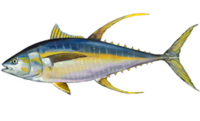
Photo from wikipedia
Abstract Small-scale fisheries, demersal, in particular, are a main fishery component in the Azores archipelago, catching a high diversity of species, including “groupers” (Serranidae family) that have high commercial value… Click to show full abstract
Abstract Small-scale fisheries, demersal, in particular, are a main fishery component in the Azores archipelago, catching a high diversity of species, including “groupers” (Serranidae family) that have high commercial value and demand in the market. Blacktail comber (Serranus atricauda) and Dusky grouper (Epinephelus marginatus) dominate grouper landings, but their fishery status in the Azores is generally unknown. This study applied a length-based approach (Length-Structured Growth-Type-Group Model) to assess the status of grouper fisheries in the Azores, using length-composition data from the commercial fishery and covering distinct gear selectivity and spatial (islands) patterns. Blacktail comber is in worse condition than dusky grouper, with spawning potential ratio (SPR) estimates below 30%, which indicates that this species is fished currently at unsustainable levels in the Azores; SPR for dusky grouper, well above 30%, suggests that this species is fished at sustainable levels. Given the low SPR estimates for Sao Miguel Island, we propose to, urgently, develop, and implement management measures to ensure the recovery and sustainability of blacktail comber. Our findings support the development of management measures that take into account different selectivity by fleet (gear) and the distinct fishing strategies by island (spatial patterns). This study, the first attempt to assess the sustainability status of serranids in the Azores, highlighted limitations of the sampling coverage that deserve urgent fix, as well as other areas where improvements are critical to ensure the sustainability of these resources in the Azores.
Journal Title: Marine Policy
Year Published: 2021
Link to full text (if available)
Share on Social Media: Sign Up to like & get
recommendations!